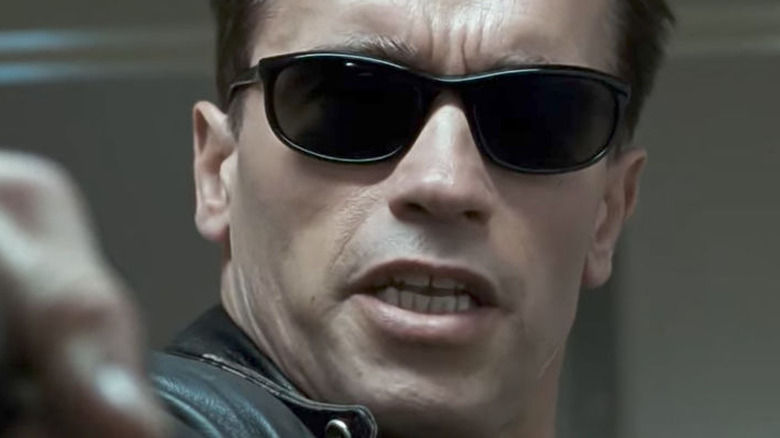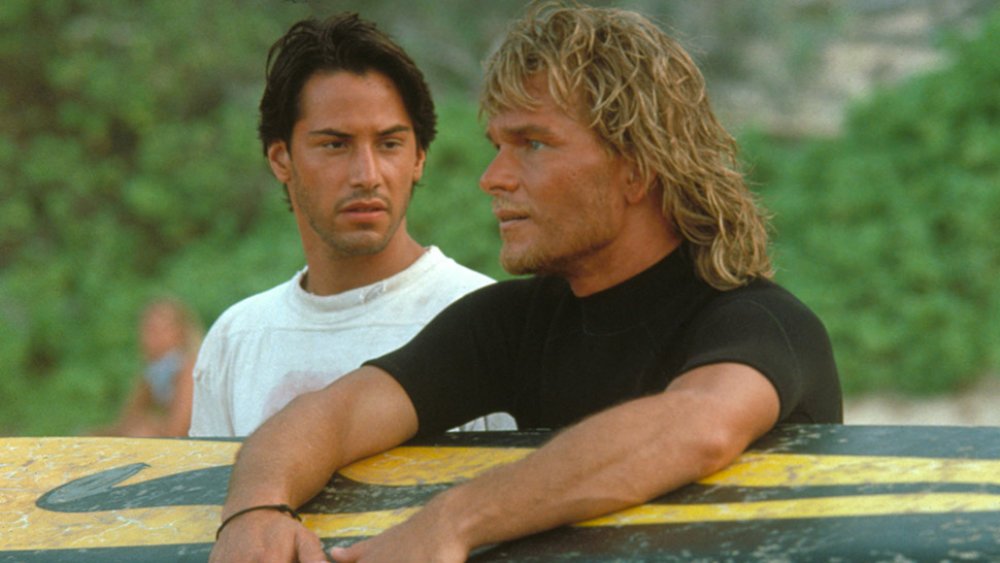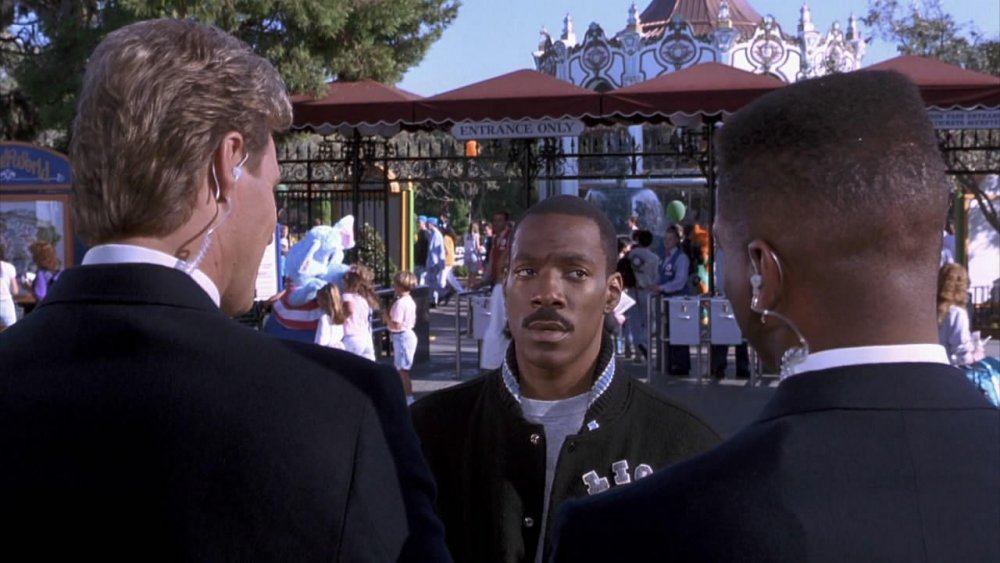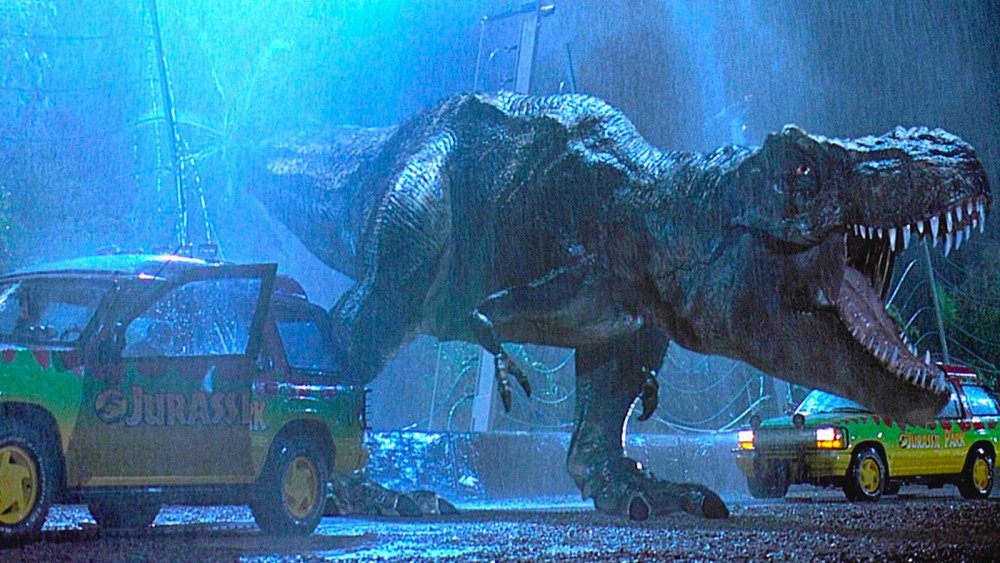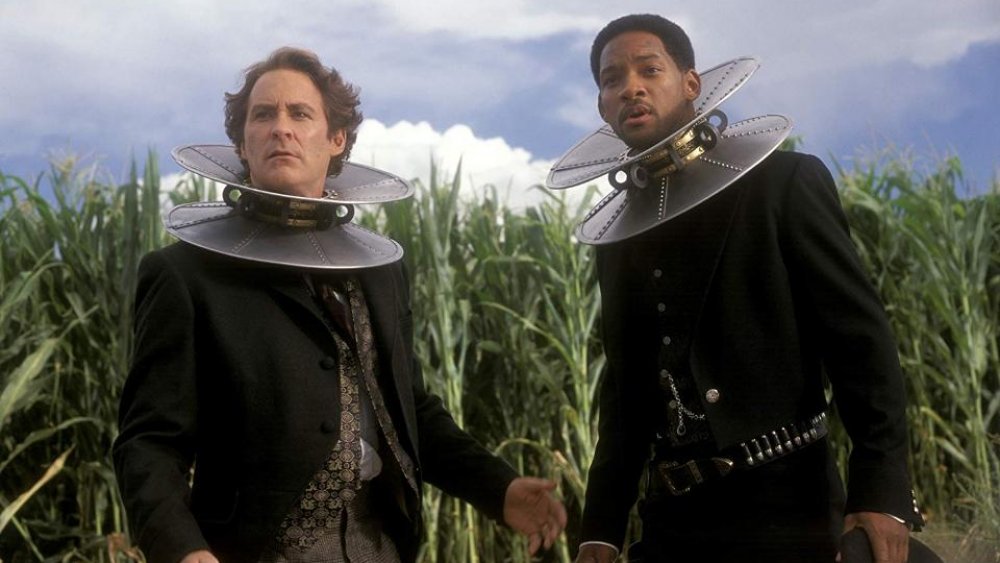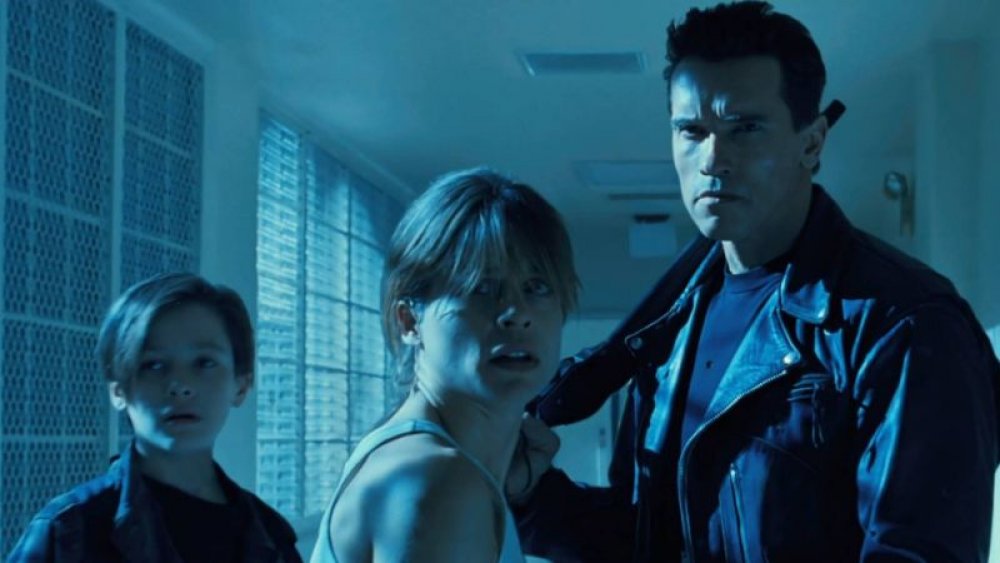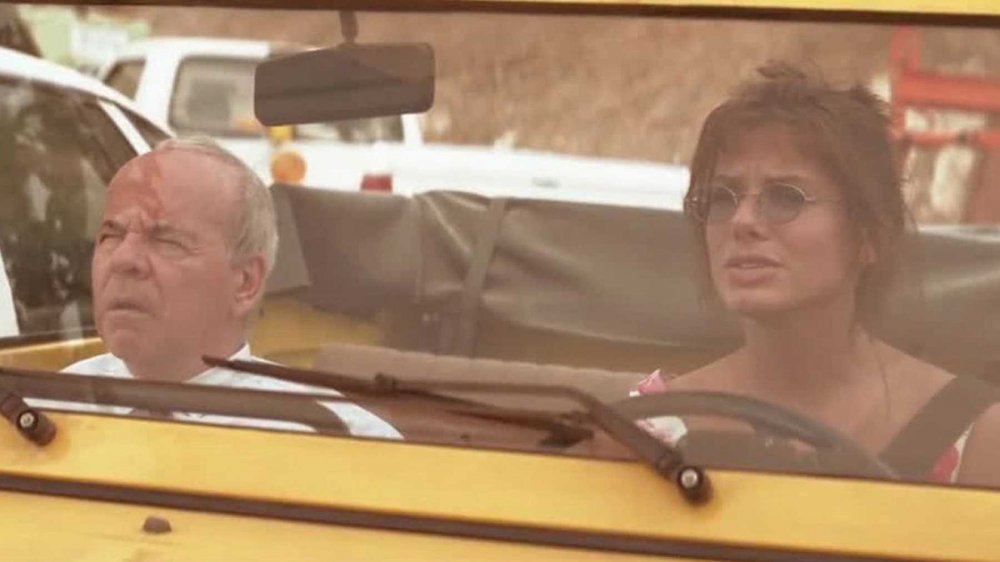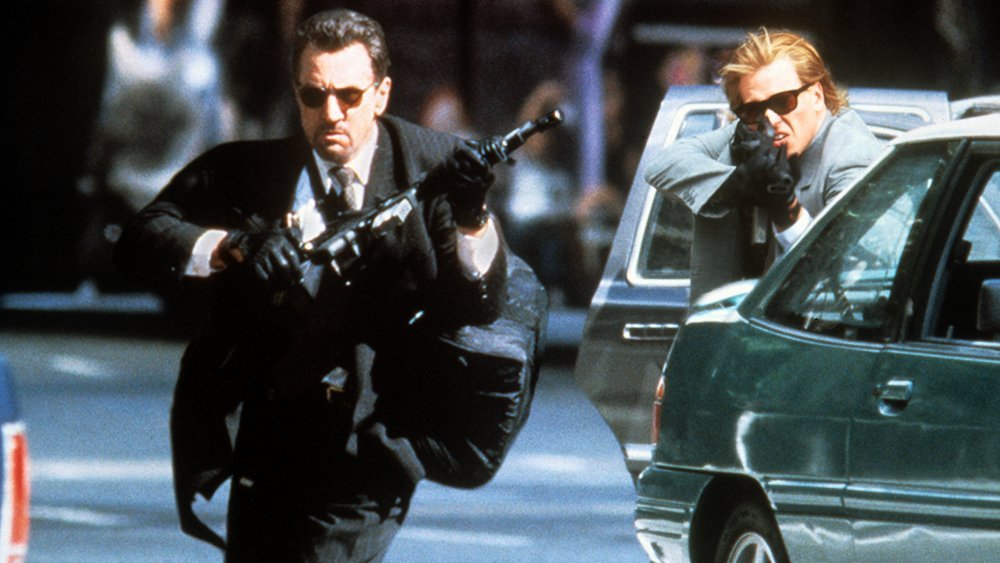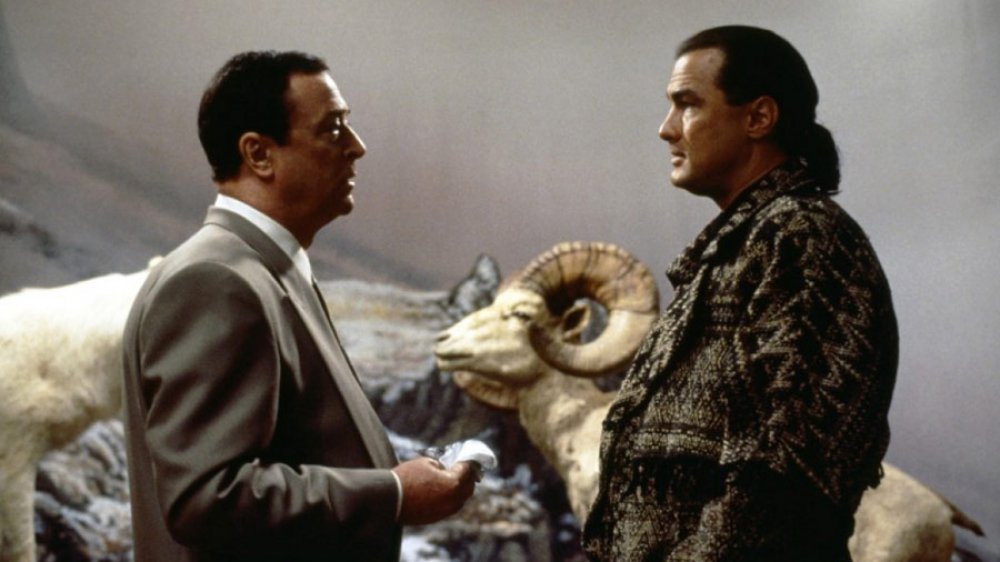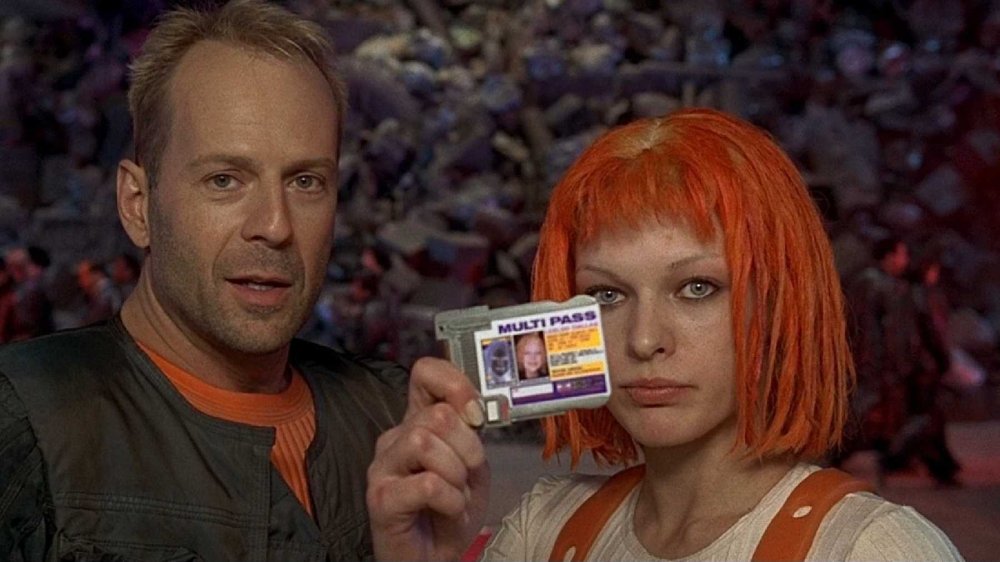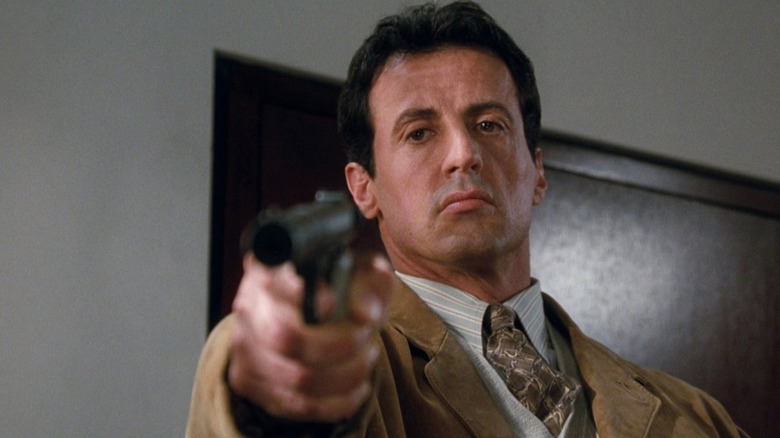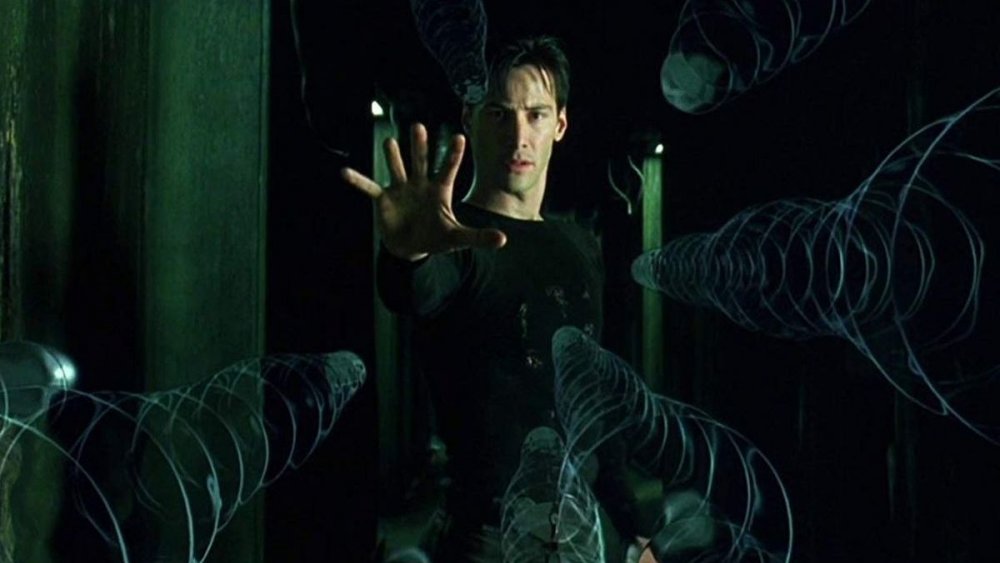The Best And Worst '90s Action Movies
If you're one of the kids who happened to come of age in the '90s, you can no doubt confirm that the decade was a tumultuous one for America. And there's little question the dual perspectives that frequently left the nation divided was reflected in the movies that made their way to the multiplex throughout the decade. As it is, the '90s cinematic scene began with a wave of bloated '80s excess, gave way to a more woke perspective via the rapidly growing independent film scene, and eventually came to a close in a fog of Y2K-fueled angst.
Somewhere in the middle, the likes of Sylvester Stallone, Arnold Schwarzennegar, and Bruce Willis ranked among the hottest stars in Hollywood. That's because they were also the driving force behind some of the biggest money-making action films of the decade. It's worth noting they were also front and center for some of the more forgettable '90s offerings.
That's hardly a knock at those iconic stars, by the way, because the action scene on the whole was the very definition of "mixed bag" throughout the decade. If you want to see just how mixed that bag was, have a look at our picks for the best and worst '90s action movies.
Best: Point Break is the greatest extreme sports crime thriller ever produced
What do you get when you take one part extreme sports thrill ride, blend it into a tautly wound crime flick, and top it off with a dash of Zen philosophizing? One of the most beloved action movies of the '90s. Yes, that bizarre genre cocktail really is the recipe behind Kathryn Bigelow's wholly unconventional, 1991 action bonanza Point Break. And yes, even almost three decades after its release, that film is still worthy of all the unflinching adoration fans continue to bestow upon it.
If you're somehow not among the rabid tribe of cineastes who continue to love Bigelow's Point Break, the film follows a young FBI recruit (Keanu Reeves) who joins a grizzled vet (Gary Busey) in the hunt for a daring band of bank robbers who enact their crimes wearing masks of ex-U.S. presidents. The FBI believes the group, dubbed "the Ex-Presidents," may be thrill-seeking Southern California surfers, so Reeves goes on an undercover mission to infiltrate a tight-knit crew led by an enigmatic board-shark named Bodhi (Patrick Swayze in a role he was born to play).
So begins a young FBI agent's soul-searching journey for truth, justice, and the perfect tube. And so begins Point Break, one of the most electrifying and endlessly re-watchable action movies ever made. It also happens to be a pretty solid little surfing film, if you're into that sort of thing.
Worst: Beverly Hills Cop 3 pretty much killed a beloved franchise
Directed by Martin Brest (Midnight Run, Scent of a Woman) and released to critical acclaim and box office success in 1984, Eddie Murphy's "fish out of water" actioner Beverly Hills Cop proved a pretty much flawless mix of detective movie thrills and raucous comedy that left audiences wanting more. They received just that a few years later, when Tony Scott sharpened both the style and the comedic attitude of the original with the aptly titled Beverly Hills Cop 2.
So successful were the first two chapters of the unlikely Beverly Hills Cop franchise, it became not a matter of if but when a third movie would be made. That moment didn't come until roughly seven years later. When it did, well, fans of the Beverly Hills Cop franchise really didn't find much to like in the utterly forgettable trilogy-capper.
Beverly Hills Cop 3 saw Murphy reunited with his Trading Places and Coming To America director John Landis, and fans of their '80s masterworks were initially excited about the duo collaborating on a new Beverly Hills Cop movie. Unfortunately, the magic just wasn't there the third time around, with Beverly Hills Cop 3 suffering from a mind-numbingly dull screenplay and a serious lack of action. Worst of all, there was little reason to laugh throughout, save for the sort of laughter that comes when something is so unbearably awful, you chuckle in pure desperation for it to be over.
Best: Jurassic Park remains an awe-inspiring blockbuster
There aren't many filmmakers with quite as impeccable a record in the action realm as Steven Spielberg. He burst onto the Hollywood scene with the killer shark thriller Jaws in 1975, and he's gone on to essentially deliver one thrill-ride after another over the course of the ensuing 40-plus years. Among his most noted action-forward works are titles like Raiders of the Lost Ark, Saving Private Ryan, Minority Report, and War of the Worlds.
Impressive as that list is, Spielberg delivered arguably his greatest action film to date in 1993 when he brought to vivid life a sci-fi stunner of a novel from famed genre scribe Michael Crichton. Titled Jurassic Park, that novel became the basis for Spielberg's awe-inspiring, franchise-launching, dino-centric adventure flick of the same name.
A genuine cinematic marvel from opening frame to last, Jurassic Park hit theaters at the height of the summer 1993 summer movie season, and it went on to become one of the most critically adored films of the year, as well as the year's biggest money-maker. And if you've seen even five minutes of Jurassic Park (about a theme park full of resurrected dinosaurs laying waste to anyone and anything in their path), you know it to be a full-blooded action spectacular of the first order, one propelled by eye-popping visuals, jaw-dropping set pieces, and bold mix of practical and digital effects that make its CGI-loving franchise brethren look comically cheap by comparison.
Worst: Wild Wild West was a low point for '90s action movies
If there's one actor who came to epitomize the unadulterated pleasures and shameless excesses of the '90s action world, it would have to be Will Smith. The actor became a big-screen sensation with the release of 1995's Bad Boys. The next year, Smith claimed legit superstar status with Independence Day, and he became the king of summer box office in 1997 with Men in Black.
Any one of those movies might be worthy of a a slot on the "best" side of this list. And if you really want to get a feel for the higher end of the '90s action scene, they're worth seeking out. However, we're covering Will Smith's decade-closer Wild Wild West because it's not only one of the worst action movies of the '90s ... it's one of the worst movies ever made.
You might disagree with that statement. Frankly, in spite of its faults, we secretly want to love Wild Wild West, if only because it's unabashed dedication to trippy, steampunk insanity borders on inspirational. But the film's numerous faults (start with the insufferably unfocused script and incessantly mugging performances and work your way up to that dreadful soundtrack single and some egregious fast food tie-ins) are really too much to ignore. As such, the film's glaring missteps undo any goodwill earned by its outlandish visual acumen, and it essentially ended Smith's impressive reign at the summer box office.
Best: Terminator 2 is one of the greatest action movies ever made
It's safe to say the 1990s saw its fair share of sequels. Perhaps more than any other decade, it also saw a lion's share of really bad sequels. There were a few exceptions to that bad sequel rule, however, and it's impossible to ignore the fact that the decade started off with one of the greatest sequels ever produced.
The film in question is James Cameron's 1991 stunner, Terminator 2: Judgement Day. And as far as sequels go, it's one of the few that's arguably better than the original. That's saying a lot because the film that preceded T2 (1984's The Terminator) is itself an unquestioned action masterpiece. That movie found Sarah Connor (Linda Hamilton) unexpectedly at the center of a future war between man and machine, one that saw both factions sending soldiers back in time, hoping to change their fates.
But in spite of best efforts from Arnold Schwarzenegger's murderous cyborg, she lived. T2 picks up more than a decade later. It finds Sarah transformed into a gun-loving survivalist and her teenage son and future resistance leader, John (Edward Furlong), the target of a perilous new threat in the form of a shape-shifting enemy. It also finds Schwarzenegger's Terminator tasked with protecting both from dire fates. Bigger and bolder than its predecessor in literally every way and full of action scenes that continue to marvel decades later, Terminator 2: Judgement Day may be the greatest action movie of the decade, if not the all-time champ.
Worst: Speed 2 proved not every blockbuster should get a sequel
When it comes to '90s sequels, you'd have to do some serious searching to find one as bad as the dim-witted followup to 1994's fantastic Speed. If you'll recall, Speed found the one and only Keanu Reeves portraying a brash L.A. cop forced to board a speeding bus and keep it above 50 mph, lest a bomb (planted by the perfectly cast "madman" Dennis Hopper) kill everyone on board.
Yes, that setup is every bit as silly as it sounds. And yes, director Jan de Bont and everyone involved turned what might've been a laughably dumb B-movie premise into a top-notch action flick with charm, wit, and spectacle to burn. It even featured a surprisingly well-written, pseudo-romantic subplot between Reeves and relative newcomer Sandra Bullock.
Not many people were calling for a sequel at the end of Speed, though, because the self-contained story hardly begged for one. Reeves wisely declined to return for Speed 2: Cruise Control. Bullock wasn't so savvy and took the lead role in the film, which basically recycles the original formula, subbing a cruise ship for the bus, bringing aboard a way over-the-top Willem Dafoe to play the new psycho villain, and adding a supremely bland Jason Patric as the love interest. The results are actually worse than anyone could've imagined, with de Bont's ham-fisted direction driving a movie that proves in its first five minutes that not every blockbuster needs a sequel.
Best: Heat boasts one of the best set pieces of the '90s
Before we get too far into our discussion of Michael Mann's masterful 1995 crime thriller Heat, we'll go ahead and admit that it's not entirely fair to label it an action movie. Truth is, Mann's searing exploration of cops and robbers maneuvering through L.A.'s perilous criminal underworld is the very definition of prestige drama, and it touts the sort of sprawling narrative, brilliant performances, and soul-crushing humanity one might expect of such fare. It does, however, also feature one of the greatest set pieces ever committed to film, so we have absolutely no trepidation slotting it in among more traditional action offerings.
We're talking, of course, about the unimaginably tense, shockingly authentic shoot-out that unfolds in the streets of downtown L.A. about halfway through Heat, which should be obvious because it's really the only scene in the film that qualifies as true-blooded action.
When we say "true-blooded action," understand we mean an upping of the action shoot-out ante that no film has matched since. We mean the sort of set piece most director's couldn't dream of pulling off in a modern tentpole flick, let alone a stark, character-driven crime drama. We're talking the sort of white-knuckle experience that really can't be explained in words because the cinematic language behind the moment categorically transcends them. And if you haven't experienced that for yourself, you really have no comprehension of how effective an action scene can be on both a visceral and narrative level.
Worst: On Deadly Ground put Steven Seagal in the director's chair
Of all the stars who made waves on the action circuit throughout the 1990s, Steven Seagal is almost certainly the one that will get the strongest reaction from film lovers. The actor had a string of minor hits in the late-'80s and early-'90s before mostly falling out of favor at the dawn of the 21st century.
Circa the mid-'90s, however, Steven Seagal was still an action star on the rise in Hollywood, and he looked to capitalize on his burgeoning stardom by doing what so many actors before him had — directing his own movie. That movie was 1994's On Deadly Ground. It found Seagal working with a $50 million budget and an impressive cast including the likes of Michael Caine, Billy Bob Thornton, and Joan Chen. It also saw Steven Seagal fall flat on his face as a director, delivering a film as cinematically toothless and uninteresting as it is simply ugly to look at.
Not only that, On Deadly Ground — which saw Seagal portraying a do-gooding, martial arts-loving environmentalist taking on a vile oil company — failed to deliver anything resembling true action spectacle. The film largely dwells in the sort of half-baked, one-man-takes on the cold, cruel world tropes that Stallone and Schwarzenegger doled out infinitely better throughout the '80s, only it did so without that absurdist '80s flare. Audiences and critics alike were unforgiving to Seagal's cinematic vision, and On Deadly Ground has largely been forgotten since its release. But rest assured, we shall never let the world forget just how bad it is.
Best: The Fifth Element is one of the wildest action flicks of the '90s
One of the golden rules for the action genre is that "spectacle is everything." Few filmmakers have taken that rule as close to their heart as Luc Besson. In fact, the concept has essentially become the driving force behind his entire theatrical oeuvre since entering cinematic fray with boundary-pushing movies like The Big Blue and La Femme Nikita. But those insane films couldn't prepare the world for just how fully Luc Besson would indulge in his gonzo, cinematic flights of fancy via his 1997 sci-fi opus The Fifth Element.
Set in a distant future, The Fifth Element finds Bruce Willis portraying a downtrodden cabbie who unwittingly becomes ensnared in the search for a mythical person/cosmic weapon (Milla Jovovich), who may prevent an empirical overlord (the great Gary Oldman) from taking control of the galaxy. That may sound like pretty standard sci-fi stuff, but there's nothing at all standard about The Fifth Element. Simply put, the film doesn't just go for over-the-top action. Instead, it seeks to blow everything to smithereens and make candy-colored sci-fi spectacle from the debris. We mean that in the best way possible because even in its near garish narrative ambition, nothing ever feels out of place in the world Besson creates — not even Chris Tucker's infamously outlandish work as Ruby Rhod.
Worst: Assassins is over-the-top '90s action in all the wrong ways
It's impossible to talk about '90s action movies without bringing up Sylvester Stallone. That has as much to do with his status as an action icon throughout the '80s than his cinematic output in the '90s, though. And there's little question that, as big a star as Stallone was in the '80s, his star status took a few lumps in the decade that followed.
That decade started bumpy with the franchise-tainting sequel Rocky V, and it only got bumpier after the release of the comedic travesties that were Oscar and the unfathomably stupid Stop! Or My Mom Will Shoot. It looked like Stallone might get his act together with slightly more straight-forward action offerings like 1993's Cliffhanger and 1994's Demolition Man, but he followed those films with 1995's abominable Judge Dredd and an equally flawed action thriller written by a then little-known writing duo named the Wachowskis.
Yes, those Wachowskis, the same who would go on to deliver such brilliant '90s works as Bound and The Matrix. Before taking their talents behind the camera, the Wachowskis penned a truly miserable little action movie by the name of Assassins for director Richard Donner (Superman, The Goonies, Lethal Weapon), one that pits Stallone's soon-to-be retiring hitman against an psychotically ambitious newcomer (a truly unhinged turn from Antonio Banderas) in a winner-take-all game of cat and mouse. Just know it hardly matters who wins said game because the film is so blindingly absurd and genuinely off-putting to look at that the audience invariably plays the part of loser.
Best: The Matrix changed the action game
After writing the truly awful Assassins, the Wachowskis made up for that misfire with their followup project, 1996's immaculately rendered crime caper Bound (which they also directed). The visionary duo then hit a legitimate home run with their sophomore directorial effort, a mind-blowing little sci-fi confection the world would come to know and love as The Matrix.
"Know and love" might be an understatement, as many practically came to worship the film when it hit theaters in March 1999. And most viewers who've chosen the red pill in the years since The Matrix was released would invariably tell you that it's all but impossible to disagree with the unbridled adoration that continues to fuel the film's legacy. Not only does The Matrix stand as a genuinely groundbreaking film in terms of special effects, it stands as a patently fascinating, pseudo-intellectual study in alternative philosophies that typically have no place in the blockbuster narratives.
The Matrix first and foremost is, unquestionably, a first-rate action flick, and its bold approach to larger-than-life set-pieces and wildly original fight choreography literally raised the bar for every action movie that followed. The Wachowskis wasted no time raising that bar, either, bringing viewers into The Matrix with one of the greatest action movie openings in history. Every moment that came in its wake only upped the ante, helping make The Matrix that rarest of action movies — one that's as viscerally thrilling as it is emotionally enthralling.
